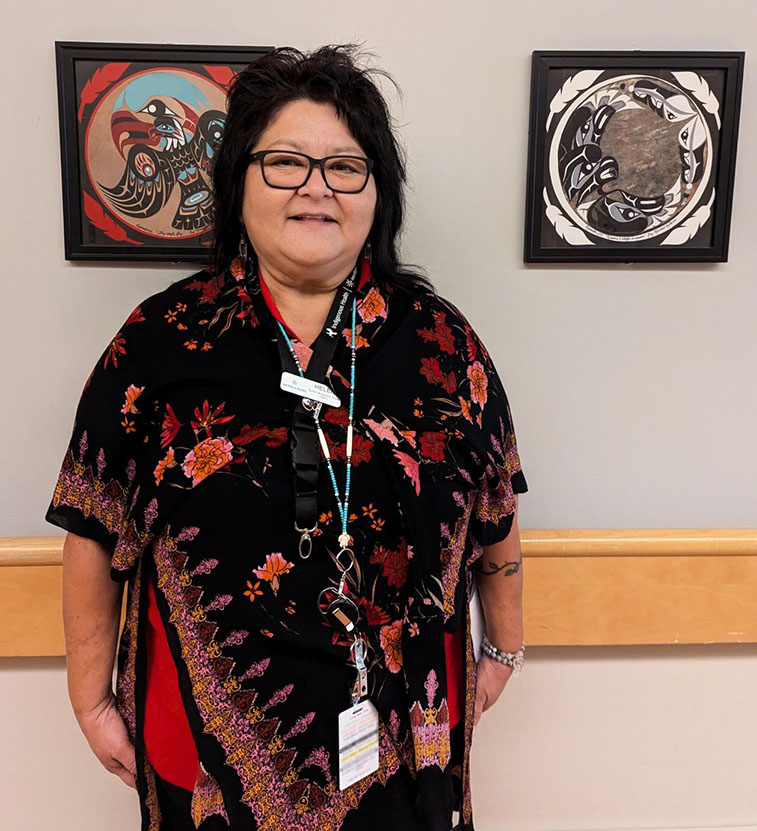How are we engaging for Cultural Safety?
Explore and adopt engagement strategies from across BC
Below are a few of many examples of how Facility Engagement is supporting Medical Staff Associations (MSAs) to advance culturally safe care across BC health care facilities, through partnerships with Indigenous communities, health authorities, and divisions of family practice.
Reach out to your Engagement Partner to learn more and connect with other MSAs.

100 MILE HOUSE: An educational experience to build understanding of Indigenous culture and relationships.
- Collaborating with the Canim Lake White Feather Clinic to host a tour of the land, share teachings, a smudging ceremony, and a traditional meal for physicians and health care providers.
- Working with the health authority to create a more welcoming environment
for First Nations members at the
hospital. Learn more
VANCOUVER: Engaging Physicians in the Cultural Safety (EPIC) Group.
- Establishing an MSA and Vancouver Coastal Health collaborative table to advance cultural safety and create meaningful partnerships.
- Organizing Indigenous Health Rounds,
education, and a patient experience
think tank. Learn more
BELLA BELLA: An MSA and community collaboration to build cultural competency and resources.
- Creating a video on First Nations’ experiences of medical care at ƛ̓uxválásu̓ilas Heiltsuk Hospital.
- Holding a joint MSA and Division in-service on Heiltsuk Herbal Medicine for physicians and visiting specialists. SALMON ARM: A Cultural Safety and Humility learning retreat.
- Arranging learning and discussion opportunities for MSA members, facility staff, health authority leaders, and an Indigenous Patient Navigator, guided by a local Indigenous consulting firm.
- Organizing experiential activities for guests with canoeing, medicine walks, sweat lodges, and cultural education.
MAPLE RIDGE/PITT MEADOWS: Strengthening culturally safe care through medical staff education and supports.
- Holding workshops, education, and resources on traditional medicines for medical staff.
- Creating an Indigenous Health Liaison role and facilitating community connections.
- Holding events that recognize both Indigenous Peoples Day and Truth and Reconciliation Day.
- Screening “The Unforgotten” on the history of Indigenous communities, with an Indigenous salmon lunch. Learn more
EAST KOOTENAY REGION: “A Journey to Cultural Safety” workshops.
- Hosting a regional learning partnership with the MSA and East Kootenay Division Primary Care Network for more than 28 physicians and other health care providers.
- Sharing practical suggestions for integrating Ktunaxa’s history, beliefs, and culture into health care.
CHILLIWACK: Building relationships for more culturally safe care.
- Building relationships between physicians, front-line care providers, and Indigenous community members, with learning opportunities.
- Collecting patient experience stories from the Chilliwack General Hospital Emergency Department, and seeking advice from partners to improve cultural safety and care.
- Organizing physician visits to youth shelter to open communication and learn about their experiences and resources to support them.
- Learn more
PRINCE GEORGE: Working towards cultural safety and humility in the emergency department.
- Holding truth-telling sessions with physicians and front line staff, Elders, Indigenous community members, and health authority leaders to build relationships.
- Developing recommendations for a more culturally-safe facility.
- Hiring three health authority- funded Indigenous Health Service Assistants and an Indigenous Patient Liaison specifically for the ED.
- Making changes to the ED space to be more welcoming with Indigenous-created artwork and bilingual Dakelh
signage.
Learn more
PENTICTON: Enhancing cultural safety in the Emergency Department (ED).
- Holding a townhall for health care providers hosted by the Penticton Indian Band (PIB) on PIB culture, residential and Indian Hospital experiences, and the resulting impact on accessing health care services.
- Organizing a learning event for Indigenous community members to demystify the ED, with a virtual ED tour, information on the triage process and accessing a patient navigator, and the Mental Health Act.
- Creating a new brochure to support community members to navigate the ED.
Learn more
DAAJING GIIDS: Collaborative activities through a hospital and Haida community partnership agreement.
- Co-renaming the Haida Gwaii Hospital and Health Centre to Ngaaysdll Naay (Haida Gwaii Healing House).
- Renaming spaces hospital spaces with Haida names for a more welcoming experience.
- Holding Elder-hosted sessions to teach physicians and staff the Haida language and share a meal.
- Developing an Indigenous-based health care curriculum for the provision
of culturally-sensitive health care
services.
Learn more
NELSON: Creating an inclusive, sacred space at Kootenay Lake Hospital.
- Establishing an MSA partnership with Kootenay Boundary Aboriginal Services Collaborative and the health authority.
- Renovating a previous chapel into an inclusive, multi-faith space appropriate for cultural practices, informed by input from Elders and Indigenous patients.
PORT ALBERNI: Engaging Indigenous partners in discharge processes.
- Holding discussions with Indigenous partners, physicians, and the health authority inpatient manager.
- Using a traditional Nuu-Chah-Nuulth healing circle to build a common understanding of issues and limitations at West Coast General Hospital.
DUNCAN: Cowichan Tribes Long House physician outreach.
- Providing culturally-safe care outside of a traditional medical setting .
- Tailoring a care model for physicians to deliver services at the Long House itself when safe to do so.
- Collaborating with Island Health to ensure electronic medical records have proper documentation for continuity of care in the outreach setting.
Doctors of BC’s commitment to a culturally safe health care system:
- First Nations community-based experiential learning sessions
- Indigenous Cultural Safety webinar series
- Indigenous artwork for doctors’ offices for culturally safe places
Indigenous Cultural Safety in the Joint Collaborative Committees
Doctors of BC Guide for Respectful Indigenous Engagement to support divisions, MSAs, and physician members in their work with First Nations, Métis, and Inuit.
Resources for learning more about Equity, Diversity, and Inclusion, and Indigenous Cultural Safety

